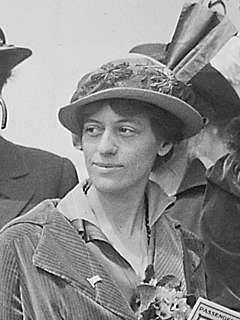A Quote by Mary Heaton Vorse
When a new idea assaults the power of established authority, authority always screams out that morality has been affronted. It makes no difference if this idea is that the world is round or that women should vote or that the workers should control industry.
Related Quotes
Anarchism, in my view, is an expression of the idea that the burden of proof is always on those who argue that authority and domination are necessary. They have to demonstrate, with powerful argument, that that conclusion is correct. If they cannot, then the institutions they defend should be considered illegitimate. How one should react to illegitimate authority depends on circumstances and conditions: there are no formulas.
To be free of all authority, of your own and that of another, is to die to everything of yesterday, so that your mind is always fresh, always young, innocent, full of vigour and passion. It is only in that state that one learns and observes. And for this, a great deal of awareness is required, actual awareness of what is going on inside yourself, without correcting it or telling it what it should or should not be, because the moment you correct it you have established another authority, a censor.
There is a great difference, then, between "power" and "authority." Power refers to one's ability to coerce others (through physical, economic, or other means) to do one's bidding. One can possess the means of power: physical strength, armaments, and money. But authority must be performed. Authority refers to one's ability to gain the trust and willing obedience of others. While power rests on intimidation, authority survives through inspiration.
True gospel authority, the authority to heal and renew things and people, is not finally found in a hierarchical office, a theological argument, a perfect law, or a rational explanation. The Crucified revealed to the world that the real power that changes people and the world is an inner authority that comes from people who have lost, let go, and are re-found on a new level.
In a culture of technique, we often confuse authority with power, but the two are not the same. Power works from the outside in, but authority works from the inside out. . . . I am painfully aware of the times in my own teaching when I lose touch with my inner teacher and therefore with my own authority. In those times I try to gain power by barricading myself behind the podium and my status while wielding the threat of grades. . . . Authority comes as I reclaim my identity and integrity, remembering my selfhood and my sense of vocation.
We are still in various kinds of patriarchal systems. The very definition of patriarchy is that men control women as the means of reproduction, so the idea that a woman's main role is to have children often means society wants more workers, more soldiers. The idea that how many children we have should be controlled by the family, the church, the nation - by anyone but women themselves - is still very deep and very strong.
If you give up on the idea that your voice can make a difference, then other voices will fill the void: lobbyists and special interests; the people with the $10 million checks who are trying to buy this election and those who are making it harder for you to vote; Washington politicians who want to decide who you can marry, or control health care choices that women should make for themselves.
The most important human endeavor is the striving for morality in our actions. Our inner balance and even our very existence depend on it. Only morality in our actions can give beauty and dignity to life. To make this a living force and bring it to clear consciousness is perhaps the foremost task of education. The foundation of morality should not be made dependent on myth nor tied to any authority lest doubt about the myth or about the legitimacy of the authority imperil the foundation of sound judgment and action.
The business side of film has goofed up so many things, but even that's changing. It happened to the music industry and now it's happening to the film studios. It's crazy what's going on. But artists should have control of their work; especially if, as I always say, you never turn down a good idea and never take a bad idea.
Twilight of the Elites main thesis has been borne out far past what I could ever have imagined. The major idea was that these series of elite failures created this crisis of authority which was fertilizing distrust in the pillars and institutions of American society. In the absence of that authority there's this vacuum which is easily filled by authoritarian solutions, and I think that's exactly what happened.






































